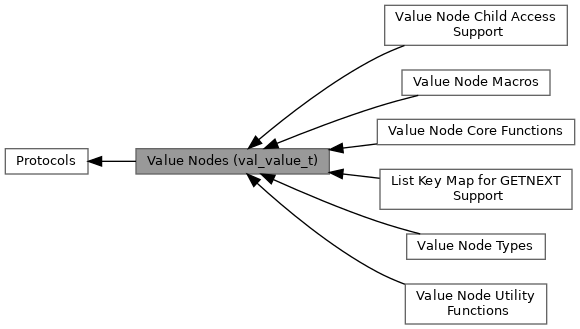 |
yumapro
25.10-4
YumaPro SDK
|
 |
yumapro
25.10-4
YumaPro SDK
|
A value node (val_value_t) represents an instance of a YANG object. More...

Modules | |
| List Key Map for GETNEXT Support | |
| Key Map provides a YANG row cache to automate the processing of GET2 callback parameters to setup the next entry. | |
| Value Node Child Access Support | |
| Manages the storage and access of child nodes within a YANG container or list instance. | |
| Value Node Core Functions | |
| Core data access functions to create and use YANG data. | |
| Value Node Macros | |
| Constants and macros used to manage YANG data nodes. | |
| Value Node Types | |
| Data types used to store YANG data values. | |
| Value Node Utility Functions | |
| High level value node utility functions. | |
A value node (val_value_t) represents an instance of a YANG object.
Value nodes used in thoughout the system are complex 'automation depositories', which contain all the glue to automate the NETCONF functions.
Almost all value node variants provide user callback hooks for CRUD operations on the node. The read operations are usually driven from centrally stored data, unless the value node is a 'virtual' value.
1a) Malloc a new value with val_new_value() or 1b) Initialize a static val_value_t with val_init_value 2) Bind the value to an object template: val_init_from_template or use val_make_simval to combine steps 1a and 2 3) set simple values with various functions, such as val_set_simval 4) When constructing complex values, use val_add_child to add them to the parent 5a) Use val_free_value to free the memory for a value 5b) Use val_clean_value to clean and reuse a value struct
A special developer-level feature to assign arbitrary internal values, not in the encoded format. Not used within the configuration database. (More TBD)
The yangcli program allows the user to assign values from user and system defined script variables to a value node. Not used within the configuration database. (More TBD)
If a value node does not store its data locally, then it is called a virtual node. Callback functions are used for almost all protocol operation support.